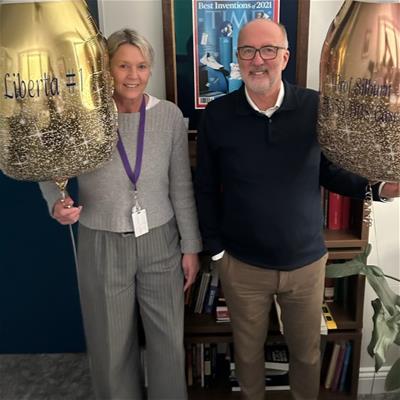St Andrew’s neurologist, Professor Peter Silburn, and neurosurgeon, Dr Terry Coyne, have become the first team in the Asia Pacific region to implant the latest deep brain stimulation (DBS) technology which enables patients to access care remotely from anywhere in the world.
This procedure also marks the pairs’ 1,350th DBS implant procedure together.
Designed to last more than a decade, Abbott’s Liberta™ RC DBS system, is the smallest device on the market, is rechargeable and has the longest-lasting battery between charges.
While DBS has been used as a treatment option since the late 90s for managing movement disorders, the latest advancements in technology offer patients the ability to manage programming for their DBS device remotely via Wi-Fi.
DBS devices send small, controlled electrical signals into specific areas of the brain which manage abnormal brain activity.
In Australia, under TGA approval, DBS is approved for drug-resistant movement disorders such as Parkinson’s disease, essential tremor, and dystonia, as well as for treatment-resistant epilepsy and obsessive-compulsive disorder. These uses are based on specific brain targets to help manage symptoms when other treatments have been unsuccessful.
The system’s NeuroSphere™ Digital Care platform allows clinicians to adjust therapy settings remotely and push software updates directly to the implanted device.
The bring-your-own-device model also means patients do not need to carry a separate programmer or go into the clinic for every adjustment.
Professor Peter Silburn said this about giving patients more freedom, control, and peace of mind.

“For people with Parkinson’s, movement disorders and other neurological disorders, it’s life-changing to know their therapy can be managed from home or even while travelling overseas,” Professor Silburn said.
“This isn't just a smaller device, it’s a smarter system designed for the next decade of care.”
St Andrew’s General Manager, Mairi McNeill, said the milestone is in keeping with St Andrew’s long history of innovation and dedication to continuous improvement.
“We are proud to offer patients one of the most experienced DBS programs in the country at St Andrew’s, a program that is deeply motivated by improving outcomes and quality of life for our patients,” Mairi said.
“I’d like to take the opportunity to acknowledge the many people it takes to continually advance what’s possible for those we care for, and to congratulate all those involved in this milestone procedure.”
Australia is a pioneer in the field of remote care for neuromodulation in the Asia Pacific region, offering patients a longer-lasting, minimally invasive alternative with seamless digital support.
St Andrew’s War Memorial Hospital is the first hospital in Australia to offer the new system.